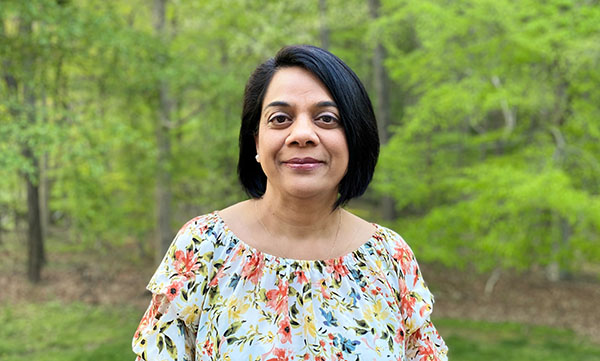
Born in India, Dr. Athena Fernandes DNP, MSN, BSN, RN-BC moved with her family to Dubai when she was just 9 years old. She lived there until the age of 17, when her family immigrated to the United States.
Dr. Fernandes had a passion for cooking — and even considered one day becoming a chef. But when she discovered the joy of caring for others, she followed this instinct and became a nurse.
As a new-to-practice nurse, Dr. Fernandes initially worked in Labor & Delivery at Chester County Hospital. While practicing at the bedside, she recognized the delivery of patient care growing more complex. Noting that technology is often both complicated and confusing, she found it challenging — like so many others — to navigate the ever-changing world of technology and care.
Dr. Fernandes often talked about these challenges with her husband, who recommended that she learn how to build and customize software applications (often referred to as coding), as she was good at problem-solving and thinking analytically.
"When I started learning to code, I was instantly fascinated," Dr. Fernandes says. "I thought to myself, 'Oh my goodness, I can write a piece of software that can do things, and by making changes to the programming, I can significantly influence the result.'"
"In many ways, coding is like cooking," Dr. Fernandes added. "You follow a recipe, but sometimes you need to modify or write new instructions, or you won't get what you need."
Fascinated by technology and what it had to offer, Dr. Fernandes wondered if this shift would be an exit point for her career in nursing. Little did she know that it would actually be the decision that led her to pursue a Master's in Nursing Informatics, followed by a Doctorate in Nursing Practice, and a fulfilling career as Director of Clinical Informatics.
What Is Informatics — And What Is an Informaticist?
Clinical informatics or health informatics refers specifically to the ways in which patient data is stored, processed, transferred and protected — particularly as it relates to your Electronic Health Record (EHR). An informaticist applies this logic to workflows that ultimately improve the experience and outcomes of patients.
For example, when you visit Chester County Hospital for your annual wellness exam, your primary care provider might take notes about a certain pain or condition you have. If they refer you for a test, any other physician in the Penn system could access that information easily — and digitally.

A Day in the Life of a Clinical Informaticist
A normal day for Dr. Fernandes and her team involves interacting with healthcare providers and administrators from all areas of the hospital. Ranging from new provider onboarding, to the investigation of challenges, to collaboration for education and enhancement of new technologies — every day is unique.
"We have an open-door policy in our team office," says Dr. Fernandes. "This means that anyone — including medical students, residents, nurses and physicians — can stop by anytime with any question that they have."
This allows physicians throughout Chester County Hospital to focus on their patients and spend less time worrying about technology. "My goal is to make sure that I alleviate any technological challenges that take away from our clinicians being able to focus on the patient," Dr. Fernandes adds. "If I can alleviate some of that stress or noise for them, then I’m doing my job right."
Using Health Technology to Improve the Patient Experience
When she merged her love for healthcare with her love for technology, Dr. Fernandes knew that she was in a special position to improve both the patient and the clinician's experience. In this role, she also brings her own cultural upbringing to the table and the unique perspective it gives her. During Asian American Heritage Month, she reflects on how this relates to healthcare.
"Our cultural upbringing, background and beliefs have a lot to do with health and our well-being. It impacts how we see ourselves when we're sick, and it can impact our recovery process too," says Dr. Fernandes.
"I come from an Indian background, where we have specific foods that we eat and customs that we follow as part of the healing process," she says. Food, language and cultural preferences are all an important part of care. Through technology and tools, informatics can provide clinicians with culturally-driven information to guide patient care.
Dr. Fernandes also shares that this work is made possible by Chester County Hospital's long-standing dedication to diversity and inclusion. "Chester County Hospital emphasizes religious and culturally sensitive care. For example, our diversity council shared information on Ramadan and fasting, so that care could be tailored for patients observing their faith."
Celebrating Asian American and Pacific Islander Heritage in Healthcare
With a background in nursing and information technology, Dr. Fernandes is changing the future of healthcare technology.
This Asian American and Pacific Islander Heritage Month’s theme is "Advancing Leaders Through Collaboration", and Dr. Fernandes' team approach proves this to be true. Advancements in healthcare are only possible when we all bring our unique skills, ideas and perspectives to the table.
Chester County Hospital uses technology and teamwork to provide the best care possible. Schedule a visit with your Chester County Hospital Primary Care Provider today to learn more.